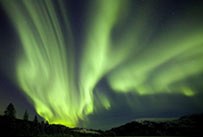Space weather monitoring
 Space weather can be defined as the variation of the flux of solar or galactic energy and matter entering and affecting the Earth system. It is mainly driven by the Sun and its activity (radiation storms, solar wind, electromagnetic fields) and it is modulated by the Earth’s environment (magnetic field, atmosphere). One of the crucial aspects for understanding and predicting space weather is the knowledge of the magnetic field in space and time, and in particular in the Earth’s magnetotail, where a systematic build-up of magnetic energy often precedes a so-called substorm.
Space weather can be defined as the variation of the flux of solar or galactic energy and matter entering and affecting the Earth system. It is mainly driven by the Sun and its activity (radiation storms, solar wind, electromagnetic fields) and it is modulated by the Earth’s environment (magnetic field, atmosphere). One of the crucial aspects for understanding and predicting space weather is the knowledge of the magnetic field in space and time, and in particular in the Earth’s magnetotail, where a systematic build-up of magnetic energy often precedes a so-called substorm.
Our approach
We are investigating monitoring space weather through a sensor network of small satellites spread through space, making multi-point measurements of basic space-weather properties. With spacecraft and telemetry resources at a premium, it is necessary to ensure that the network is configured and the data sampled in an optimal way. Informed by space-weather physical models, the character of the sensed data and the achievable satellite orbits, we are developing spatial-temporal modelling of a 3D network of moving sensors in space to inform the optimal design of a working satellite network. The research tackles general questions of spatial-temporal modelling of sensor data, optimal sensor positioning, sampling and data selection in constrained, dynamic 3D sensor networks. Building spatio-temporal statistical models will also aid development of our understanding of the trade-offs in sample coverage, sample rate, precision and redundancy requirements such as cost.
Why is this research important?
Study of the electromagnetic environment around the Earth is fundamental to our understanding of space plasma physics. In addition, by modelling and observing space weather we can understand its effect upon the electromagnetic environment around the Earth. Space weather monitoring and early storm detection can be used to mitigate risk in sensitive technological systems, on the ground, but also on aircraft and spacecraft (The monitoring of space weather was formally included in the National Risk Register for Civil Emergencies (NRR) in January 2012.)

